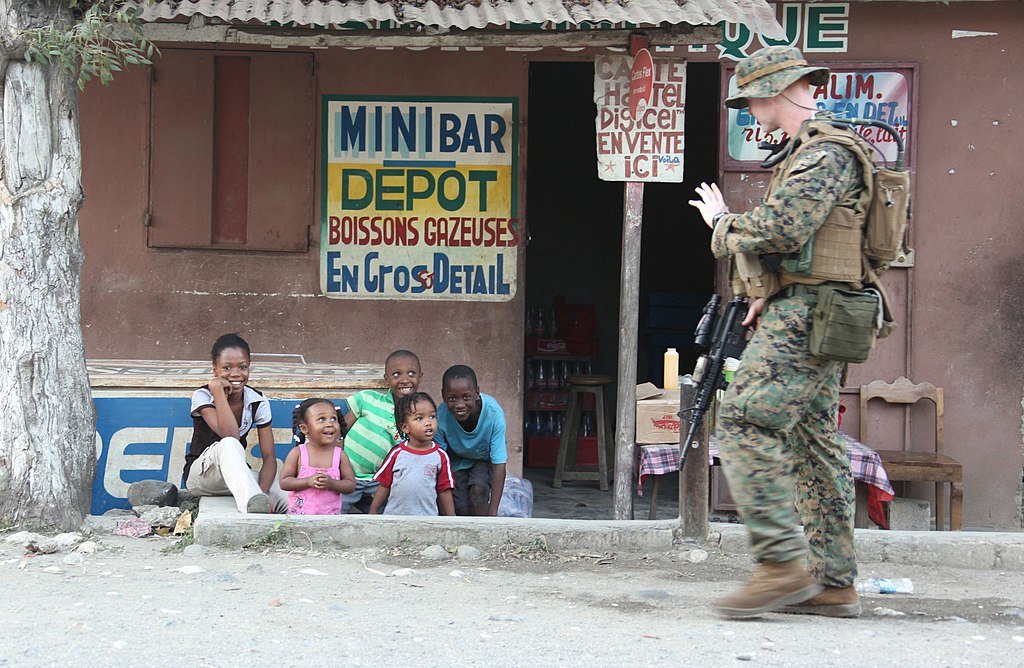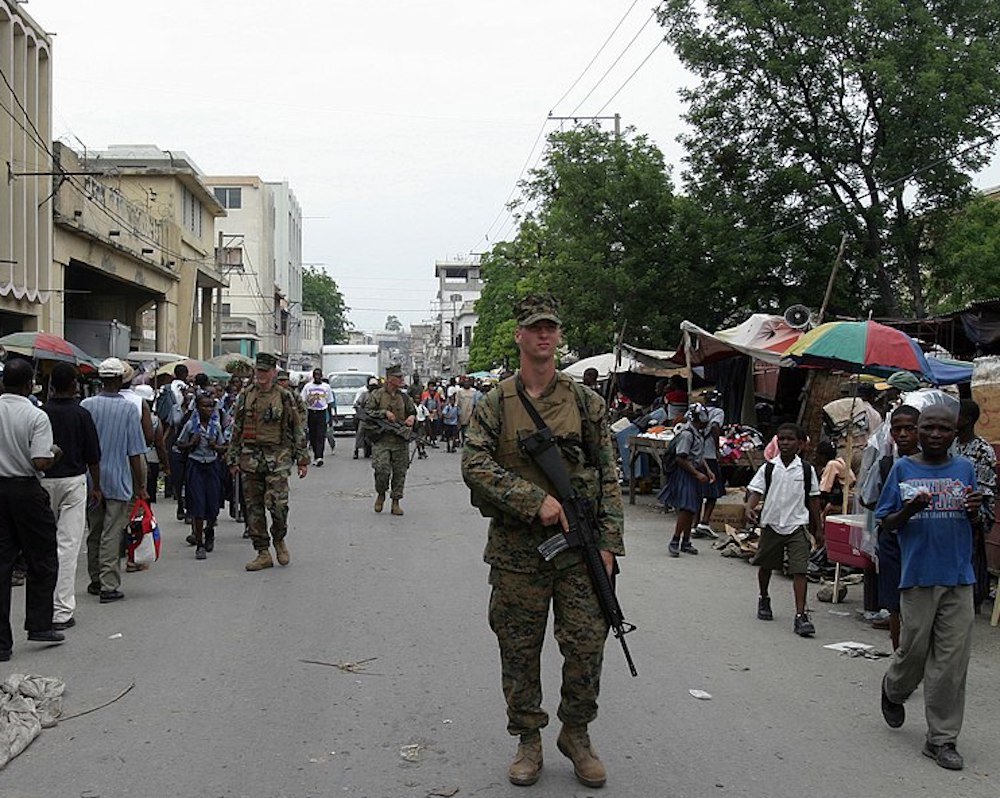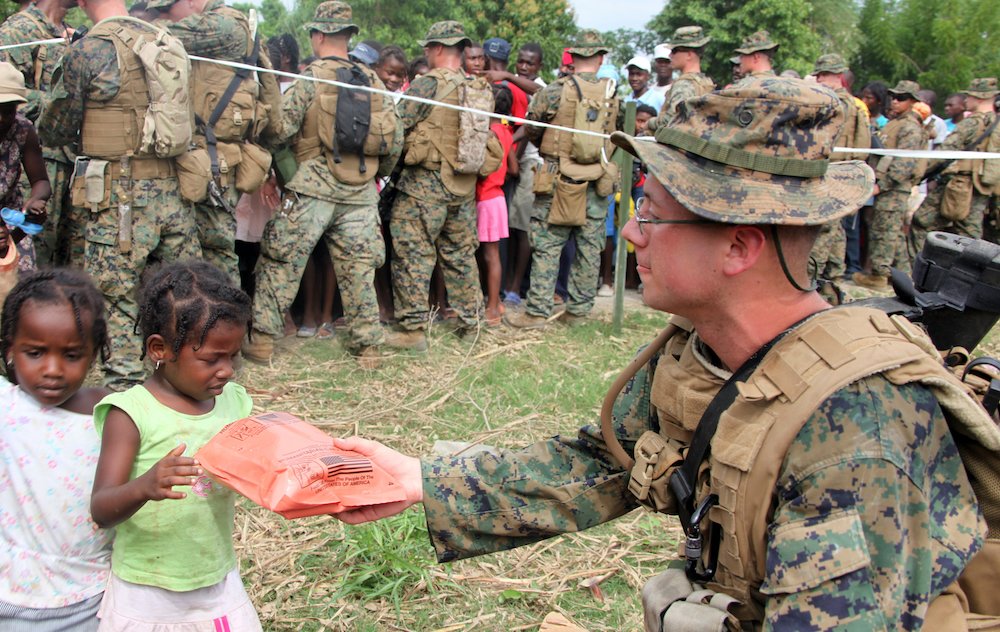After Presidential Assassination in Haiti, Pentagon ‘Analyzing’ Troop Deployment to Island Nation

A Marine assigned to the 22nd Marine Expeditionary Unit waves at children during a survey of Léogâne, Haiti, Jan. 24, 2010. Haiti sent a request to the US Department of Defense for military assistance following the assassination of its president on July 7. US Marine Corps photo by Cpl. Bobbie A. Curtis.
Following the assassination of Haitian President Jovenel Moise Wednesday, the Haitian government has requested the presence of US troops. Pentagon spokesman John Kirby said on Fox News Sunday that the Department of Defense was currently “analyzing” the request, prompting questions about whether the US would once again send troops to the Caribbean island nation.
“I think that restraint in deploying US forces is advisable — absent a total collapse or major humanitarian crisis — because the solution to this political problem has to come from Haitian institutions and civil society with the interagency support of the US government, not via Department of Defense intervention,” Dan Mahaffee, senior vice president and director of policy at the Center for the Study of the Presidency and Congress, said.
Nonmilitary elements of the US federal government deployed to Haiti Sunday to assist with the investigation into Moise’s death, Kirby said. An “interagency team,” primarily made up of Department of Homeland Security and FBI members, is now in Haiti.

“I think that’s really where our energies are best applied right now in helping them get their arms around investigating this incident and figuring out who’s culpable, who’s responsible, and how best to hold them accountable going forward,” Kirby told Fox News Sunday.
On the night of July 7, a group of gunmen entered Moise’s home and shot him and his wife multiple times.
According to the BBC, Moise died after receiving 12 gunshot wounds and having one of his eyes gouged out. His wife, Martine Moise, survived and is reportedly in stable condition after being airlifted to a hospital in Florida.
Almost immediately following Moise’s assassination, the Dominican Republic sealed its border with Haiti. According to the BBC, Haitian police pinned the attack on a group of 28 foreign “mercenaries.” Of that number, three have been killed by Haitian police, eight are on the run, and 17 have been captured.
Eleven members of the assassination team were arrested after they broke into a Taiwanese diplomatic compound.
Potential instability in Haiti could warrant US military intervention, some experts say. The last time the US military deployed to Haiti to provide security and stability for a Haitian government in crisis was in 2004. According to The New York Times, Marines were sent to Haiti in 2004 to provide such security and stability following the forced resignation of then-President Jean-Bertrand Aristide. The Bush administration forced Aristide, the first democratically elected president of Haiti, from power after his violent crackdowns on political dissent led to an armed insurrection.

“Haiti was already showing a range of warning signs regarding political instability before the assassination of President Moïse, and the assassination now introduces the risk of a cycle of violence into what has been political squabbling and power struggles,” Mahaffee told Coffee or Die Magazine in an interview.
According to Military Times, Haiti is currently being led by interim Prime Minister Claude Joseph, who enjoys the support of both the police and the military. However, the day before Moise was assassinated, Moise designated Ariel Henry as prime minister. Moise’s Tet Kale Party supports Henry’s claim, along with their replacement for the slain president.
According to multiple sources, the situation in Haiti remained calm over the weekend. At the same time, both Haitian and US authorities remain focused on tracking down Moise’s killers.
“I don’t know that we’re at a point now where we can say definitively that our national security is being put at risk by what’s happening there,” Kirby said. “We value our Haitian partners, we value stability and security in [Haiti]. And that’s why we want to send a team down there today — to help them get their arms around exactly what happened and what’s the best way forward.”
Read Next: Experts Challenge Biden’s Afghanistan Withdrawal Prediction

James Webb served as a US Marine infantryman from 2005 to 2010, completing a combat tour in Iraq. He’s worked as a freelance writer and photojournalist covering US troops in Afghanistan, and Webb spent more than two years in the US Senate as a military legislative assistant and as the personal representative of a member on the US Senate Foreign Relations Committee.
BRCC and Bad Moon Print Press team up for an exclusive, limited-edition T-shirt design!
BRCC partners with Team Room Design for an exclusive T-shirt release!
Thirty Seconds Out has partnered with BRCC for an exclusive shirt design invoking the God of Winter.
Lucas O'Hara of Grizzly Forge has teamed up with BRCC for a badass, exclusive Shirt Club T-shirt design featuring his most popular knife and tiomahawk.
Coffee or Die sits down with one of the graphic designers behind Black Rifle Coffee's signature look and vibe.
Biden will award the Medal of Honor to a Vietnam War Army helicopter pilot who risked his life to save a reconnaissance team from almost certain death.
Ever wonder how much Jack Mandaville would f*ck sh*t up if he went back in time? The American Revolution didn't even see him coming.
A nearly 200-year-old West Point time capsule that at first appeared to yield little more than dust contains hidden treasure, the US Military Academy said.












